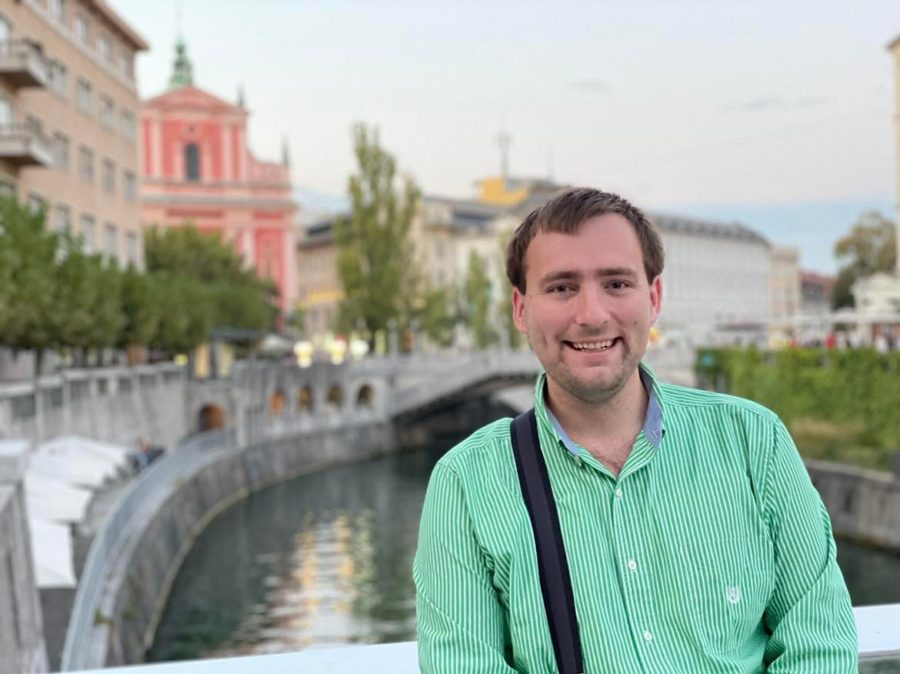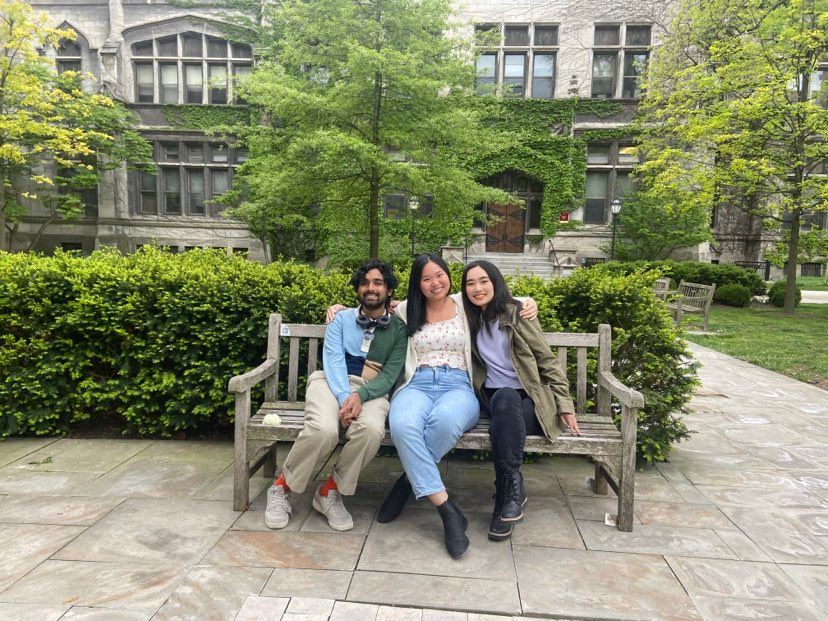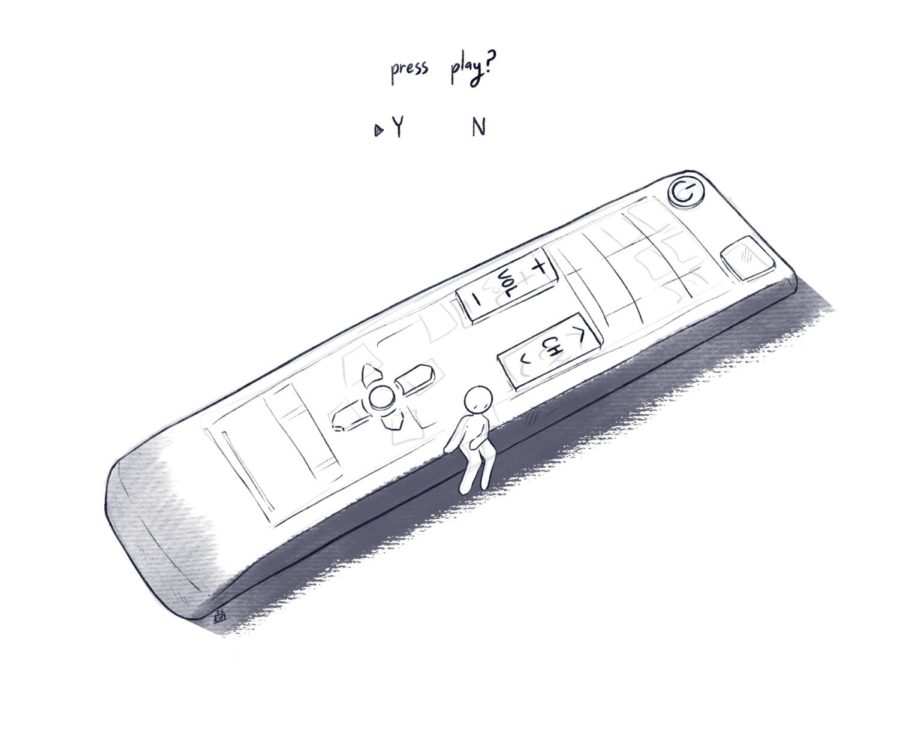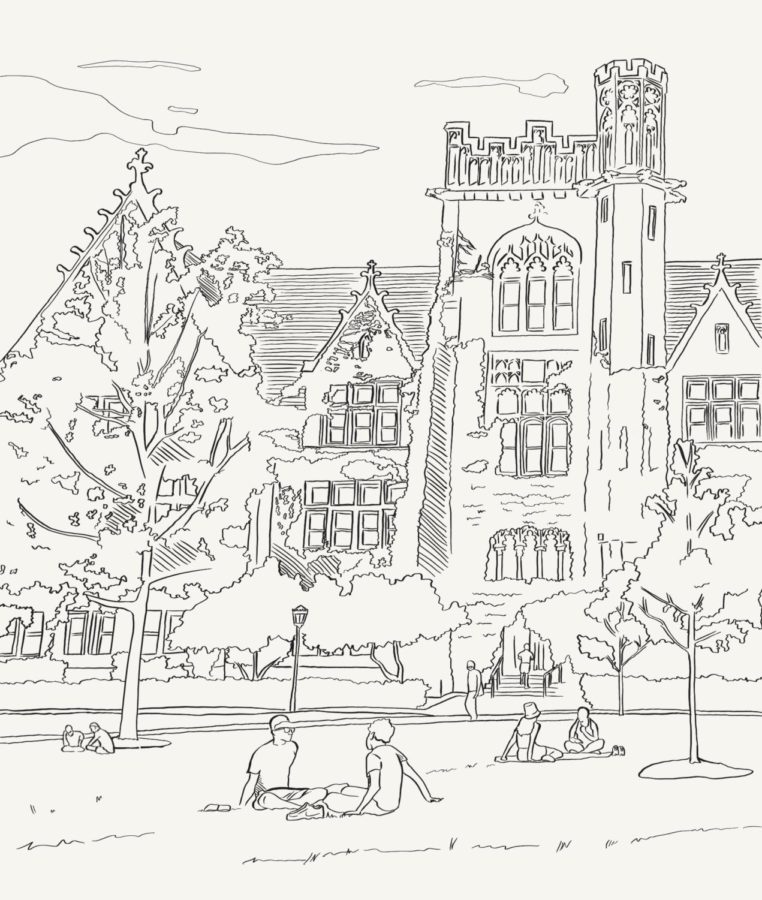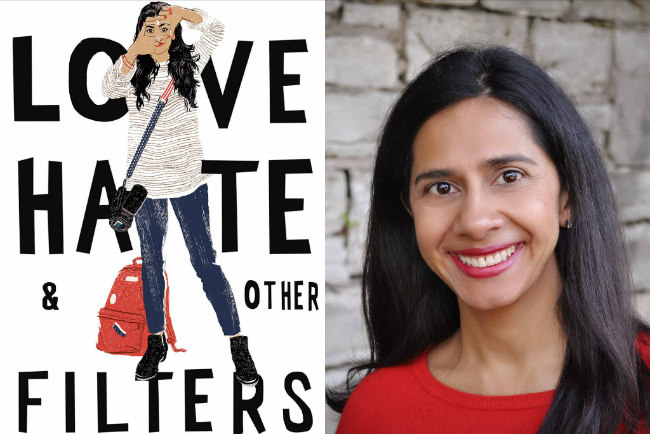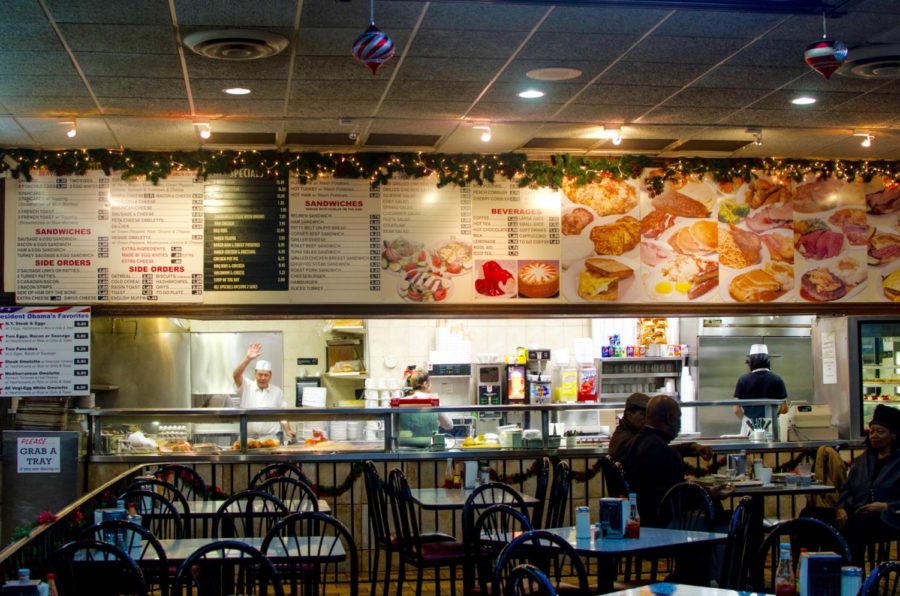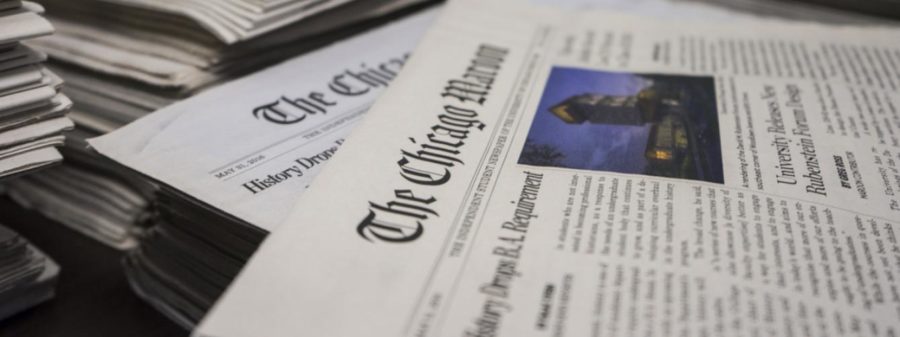Per tradition, The Maroon sat down with outgoing Undergraduate Student Government (USG) President Allen Abbott to discuss his time on Student Government (SG), COVID-19 challenges, the academic calendar, and his advice for the incoming slate.
Abbott is a fourth-year majoring in East Asian languages and civilizations and Law, Letters, and Society alongside a joint master’s degree in international relations. In October 2020, Abbott was elected College Council Representative for the Class of 2022 by a tiebreaker vote between two write-in candidates. He was also appointed SG historian in February 2021 and served the position for the rest of the term. While on College Council (CC), he led the creation of a bill that would split SG into Graduate Council and Undergraduate Student Government (USG) and later served as the Transition Committee Chair, once the resolution was passed.
In June 2021, Abbott was elected USG’s Vice President of External Affairs and later spent a few months as the acting College Council Chair. In January 2022, Abbott became the president of USG for the rest of 2021-22, replacing Parul Kumar, who resigned the previous month.
The interview was edited and redacted for clarity purposes.
Chicago Maroon (CM): What inspired you to get involved with USG?
Allen Abbott (AA): So I will be honest, nothing really inspired me to join the Student Government at the time. There were two people who decided to write me in [as a College Council representative]. I have strong suspicions of who they are, because they told me after the fact, and they did so of their own volition. I had no intention of running for College Council. And yet, somehow two votes were enough to get tied for the last seat on the council for my class and I won the tiebreaker. I don’t know if this is a good thing or a bad thing, but it worked out pretty well for me.
It was somewhat rhetorically powerful to say that you are an elected representative of the class of 2022, which is about 1800 people. I realized very early on that I can reach out to administrators about issues that I cared about or that the people around me cared about. And that was a gateway to be able to work on these issues.
So the story of why I got involved in the Student Government is very different from what inspired me to actually start taking Student Government very seriously. You’re given a title; you’re given public trust in this, you know, representative-elected position, and you’re supposed to use it That’s what inspired me. I just wanted to help people.
CM: What do you see as your greatest success?
AA: I think the Pass/Fail was the major initiative. I wouldn’t necessarily say it’s the greatest success. We’ve had a lot of successes, but it’s certainly what really demonstrated to the University, the student body, and certainly, I think, to people in Student Government that the organization that we’re in can matter and does matter.
It was mid-November, and Naa [Asheley Ashitey], the College Council representative from the Class of 2021, whom I consider a mentor of mine–[she] really taught me a lot and showed me a lot of new perspectives about what it’s like to be a marginalized student at UChicago. She was the primary sponsor of this resolution for Pass/Fair grading during the COVID-19 pandemic. We sent it on to the [SG] executive slate at the time. We were meeting with Dean [Jay] Ellison and Dean [John W.] Boyer, who basically said that we don’t make college policies based on student petitions or student polling. It was very frustrating.
I remember on a Zoom call with Zebeed [Nuguse], the College Council Chair at the time, and Julia Brestovitskiy, College Council Representative for the Class of 2024 at the time, all of us were saying that there is gotta be a different way to approach this.
In June 2020, just a couple of months prior, Tyler [Okeke] and Bianca [Simons], who were also on College Council at the time, had done this “Right to Grieve” campaign, where they had individually reached out to all of the departments for academic accommodations or academic adjustments for students during the era following the death of George Floyd. So we took inspiration from that, and we spent our Thanksgiving break that year reaching out to every department and negotiating back and forth. We created a website overnight. I remember flying back home on a red-eye and I spent the entire flight building a website to track all the different departments’ policies. We got Pass/Fail adjustments for over 70% of the College and I think that was like the moment where a lot of people across the board started to take us a little bit more seriously. If we approach these sorts of issues that really matter to students strategically, we can get a lot done for students.
CM: The initiative also inspired longer-term cooperation or relationship-building with the faculty council.
AA: Yeah, about a couple of weeks or a month after the Pass/Fail initiative, I was the primary sponsor of a resolution about student input and it was one of my favorite resolutions that I’ve ever written. The core thesis was that the University heralds these values of free speech and faculty governance and open debate, and critical to all these elements of that is the Chicago principles or the Calvin report, which should be open discourse. However, the Pass/Fail initiative along with a long list of issues that students had reported was either not taken seriously by the University administration or was decided without meaningful student input. The other really big example is the academic calendar.
In the resolution, we detailed what standards we would like to see for student involvement in University decision-making. An area that we identified that would be very strategic and important for students to have a closer relationship with was the various faculty governing bodies. They’re much more advisory than anything else at this point. But because the power of Student Government and the ability for Student Government to get things done at the University is very much in terms of consensus building and in terms of, you know, being able to talk to people in many different corners of the University and take information from one area and bring it to a meeting with another and facilitate those connections and put together a mosaic of different strategies, of different information, and of different stakeholders. And it’s through firm connections and good working relationships with all these different governing bodies that we would be able to prevent something like the academic calendar from happening again because you would know about it before it was implemented. So we could address the situation before it was finalized. We can ensure that students are properly heard and we can influence University opinions respectively.
CM: So what is it like doing all of this during COVID?
AA: There are a lot of times that, such as when I had COVID, I felt very much alone in terms of support from the University. A driving force behind a lot of the work that myself and so many others in CC in my third year did was just trying to offer as much care and support and camaraderie to other students as possible. Working during COVID was very, very difficult.
I will take the Omicron situation for instance. I was on a road trip to a very remote area with my family when I got an email from an administrator a couple of minutes before they went out to the entire University that was like, ‘just want to let you know that the University is going to be delaying winter quarter start for a week, and it’s going to be remote for the first two weeks of the quarter.’
Most of USG basically had to disrupt their winter break to get involved in service and to try to help as much as possible. I think that Omicron was a really stressful period for a lot of people in USG–and it was supposed to be our time to relax and rejuvenate. But, it was the time when we really functioned like a well-oiled machine. Almost all of CC, the entirety of the cabinet, and various committees were involved in their piece. After Christmas weekend, we were having meetings on an almost daily basis with the epidemiological team, Housing and Dining, Campus and Student Life, the College, and people in the Provost’s Office. We were having daily meetings. We were contacting congressional representatives to try and make sure that COVID tests could reach students in the residence halls.
The experience was both a blessing and a curse. It demonstrated the capabilities of Student Government and the passion that all of us have. When you join USG, it is more than just a resume booster. It’s more than just saying you have a fancy-sounding Student Government position. You are able to raise issues that affect hundreds or thousands of students and positively benefit them. On the other hand, maybe this work can be done more efficiently by the University. Maybe it shouldn’t necessarily be [on the] students to figure out within 72 hours how to get high-quality masks that the University is recommending students wear to class but aren’t actually able to provide.
CM: What do you see as the relationship between USG and the University?
AA: Student Government is a strange place. Our job is to represent students, but our job is also to keep a hold of the big picture and to ensure that we are approaching what students want most strategically. That doesn’t always translate well between either side. We are the only student organization that is in this middle space, where we are formally recognized by the University as representatives of the student body, which confers a lot of access, but we also need to make sure that we are both fostering that relationship and also doing our jobs as representatives. So, it’s very tricky.
This issue has come up many times. [The academic calendar] may be one of the worst decisions that the University of Chicago has made in recent memory. I’m glad that there are some administrators who are stepping up now and are realizing that this is a problem. Certainly, faculty are realizing this is a massive problem, and so it is starting to be taken more seriously. But the calendar is an example of a situation [where] USG is in the middle ground. We are just trying to get the University to agree to see a new committee to reevaluate the calendar [with the] benefit of hindsight and not even necessarily agree to any hard reforms. We are not necessarily pushing in these meetings that we are having weekly [that] we need to go back to ten immediately. But we’re also very clear in saying that we are moderating our stance to try and meet you in the middle. But if I went and told students that all we’re pushing for is to have a reevaluation committee that might take a year to do its work, they will burn me at the stake, because students really need extra time right now.
So that’s the thing: even when we are trying to meet halfway in the middle and we are trying to be very reasonable, there are so many identifiable issues with the calendar with how the calendar is designed and implemented. It’s not just a student issue. I think that we’re closer than ever to potentially getting what we’re asking for in the evaluation. It’s hard. It’s really hard because there are times when I just wish that we could take a much more extreme line that I know at the end of the day wouldn’t be productive.
There are so many organizations that are valuable and necessary and that are able to take those harder lines that we are seeing. At the end of the day, we still need to be in that middle in that weird sort of nebulous in-between space in order to still be able to communicate the bigger picture.
CM: What progress have you made on the academic calendar?
AA: Really, it’s a question of “Is the University going to listen to its faculty and students when 90% of them are saying that this is a really big problem?” I mean, we’re getting closer. We met with the committee in the [faculty] council a couple of weeks ago. And they heard us. A couple of them had students at the College and so they immediately understood what we were talking about in terms of how unique the burnout is now that [the quarter is] under 10 weeks, and just how much worse everyone’s mental health is. I think one of them said, “It’s very simple. You want the education that you’re paying for. We are getting 10% less education each quarter and the price is still increasing tuition-wise.” So, I mean, what the faculty were told was that the calendar reforms were a student-driven change, and the reforms being what the Roth report said about shifting from nine to ten weeks. And faculty were basically told that students really want these calendar reforms and that it’ll fix two pain points for faculty: it will remove the quagmire of people having to take early finals in spring because of early start dates for internships, and it will ameliorate the issue of students leaving early for Thanksgiving break. So faculty were like, “Okay, if students like it, and if it solves these two kinds of annoyances for us, then let’s go ahead and approve it.” So there was faculty support, certainly, for the calendar when it was implemented.
But, I think a lot of people—just based on USG talking to over 60 departments this year—I think faculty realize [now] that when they approved the report, there was no public deliberation. If they weren’t on these governing bodies, they weren’t asked. There is sort of an understanding that there was a mistake made with approving this calendar, especially once they hear about how little student involvement actually went into the calendar. The only students consulted in the calendar were the Maroon Key Society under the old model, which required you to have a very high GPA and you had to be nominated by a faculty member and then were hand-selected by the College. Even for the people on there, when the Roth committee came to the Maroon Key Society to ask them about their thoughts on the calendar, the questions were about, “do you like the quarter system?” It was not about the nine-week quarter.
So there was no student review of the calendar. There were two undergraduates on the Roth committee, and one of them wrote a defective dissent about the reading period and how the reading period was essentially being demolished by the Roth Committee and how, you know, the University should take another look at how other universities handle reading periods. Nobody is. Half of the Roth report is actually saying that a lot of additional things need to be changed to make the nine-week quarter happen and even then, there’s a lot of evaluation that should go into seeing what the effects are. I think the University sort of pulled out the pie before it was finished. And so I think people are starting to realize that this is an issue. I think we’re having some inroads with some very high-level individuals, but there are also some other individuals who are at the center of the calendar who really don’t want to talk about the issue and that’s really frustrating.
When we met with President [Paul] Alivisatos in March, we printed off 100 pages of information on everything that USG was doing, where we featured the calendar prominently. Something that we included is these archival documents of the first time when UChicago considered the academic calendar. It was in 1983, two years after President Alivisatos graduated. Something that the spokesperson of the Faculty College Council at the time wrote was, “our proposal clearly envisions a reduction of workload by 1/10 of spread more evenly in fall and in winter when problems of adjustment and of our environment are the most pressing. We see no virtue in tampering with the calendar, for the results will simply be the ten weeks’ worth of assignments being crammed into nine teaching weeks. Indeed, such a prospect can only exacerbate what we believe to be a serious problem for both faculty and students.”
After this report was released in 1983, the faculty governing bodies thinking about this calendar change worked with the Student Government at the time to create some public town halls and spaces for deliberation. By the end of that academic year, this nine-week quarter proposal was rejected soundly because of faculty and student resistance to cramming everything into nine weeks. Instead, the four-day full reading period that we used to have was created as a result. You read that quote, and that could totally apply to the current situation, but we haven’t learned from the past. We’re making the same mistakes that we almost made in 1983. The only reason why we’re making them is that we are not doing what the University of Chicago is purportedly meant to do, which is to uphold the Chicago principles.
CM: What’s your advice to the incoming USG slate and cabinet members?
AA: Be observant, be tenacious, and hold yourself accountable to your peers.
So much of the Student Government is about taking initiative. If I could do things over again, something that I wish I would have developed in the organization was to archive our institutional memory. There’s still a lot of room for growth there. There are some people who are naturally willing to create space for themselves and to initiate big changes, and that’s sort of like what happened with the transition committee last year. There is a group of us, myself, Julia, and a couple of others on the transition committee, who saw that there are some very big avenues for reform and structures for Student Government. So we created the transition committee, and that was very much unprecedented. We were learning as we were going.
So some people are naturally good at that. But there are also a lot of very talented people, especially coming in new to this giant organization, where it’s not always easy to be able to create that space yourself, especially from an intersectional perspective. I’m very confident working and being motivated and driven, as a white guy. That’s not the same for all identities. That’s not to come off as patronizing or anything, but USG needs to be aware of gender and racial dynamics. We have the committee on marginalized Student Affairs working on a marginalized student report right now to see how USG internally can be better to make the space better.
Something that I’m really proud that we did last year was that we named three awards that are going to be perpetual each year after three marginalized students who did incredible work for our University and for Student Government. Jahne Brown, who was the president in my second year, 2019-20. Zebeeb, who was on Student Government for three years, including College Council Chair 2020-21. Then Naa, who was a College Council representative last year. They all inspired a lot of people, myself included, to really see more and do more in Student Government. But they left a very imperfect institution, and I’m going to leave a very imperfect institution. So we all need to be more mindful about how we work with each other, and how we ensure that we can uplift everyone.
Student Government is in a position now where it’s taken seriously by a lot more people than it was when I came in. We are not always effective. We fail many times at achieving our goals, but we are also very successful a lot of times when it matters. So it’s just a matter of finding ways of improving inclusivity and that doesn’t have to come at the cost of our mission. I don’t have all of the solutions. And I’m not going to have all the solutions by the end of June and nobody will have all the answers. But it’s about trying to create an environment where as many people as possible might have pieces of the answer and can feel comfortable contributing those elements to improve the organization for the better. So just to recap, the key is to be cognizant of the people you’re working with and try to uplift them and try to support everyone.
At the same time, be ambitious. Recognize that you need to collaborate with the University in order to fulfill your mission. And you need to work with administrators. All of them are very well-meaning even if there are a lot of things that I would like to see different or most students would like to see different. Just recognize that there is a balance. It’s okay to be in a partnership with University offices and administrators, but also there is a need to push them in areas where you’re not seeing enough action.



